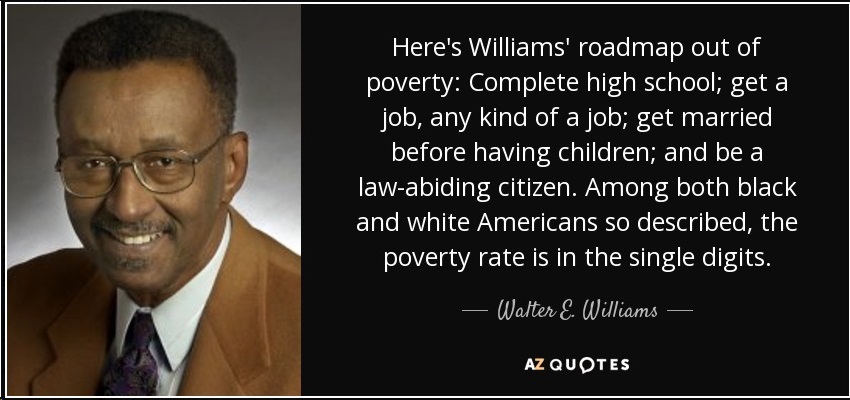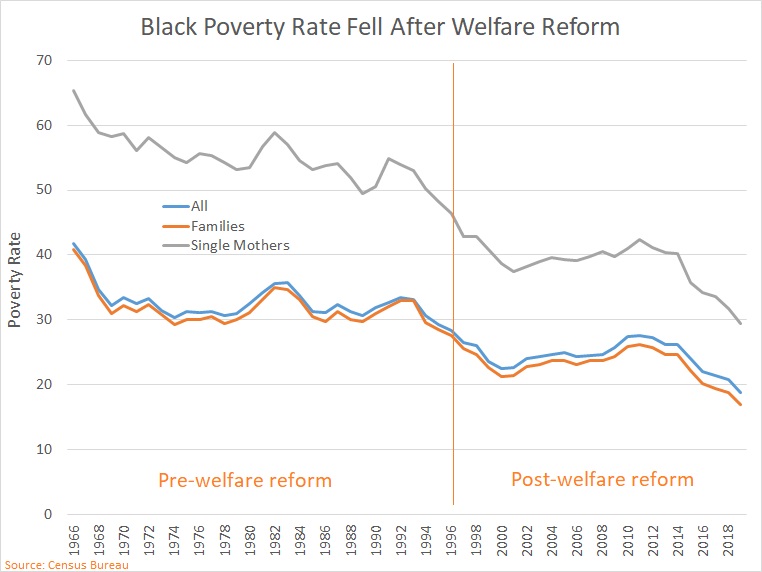Here are four things to understand about poverty and dependency.
- Throughout most of human history, harsh material deprivation
 was the norm for the vast majority of people.
was the norm for the vast majority of people. - The development of free enterprise and economic liberty led to dramatic increases in living standards.
- The poverty rate declined significantly in the 1800s and early 1900s when there was no welfare state.
- After the welfare state was created, poverty and dependency stopped declining.
Now let’s add a fifth item.
- The United States adopted welfare reform in the mid-1990s.
Today’s column examines whether this was a bad development or good development.
We’ll start with a harsh critic.
In his column for the New York Times, Charles Blow wants Democrats to repeal Clinton’s welfare reform.
Clinton’s record, particularly with respect to Black and brown Americans and the poor, was marked by catastrophic miscalculation. …the welfare reform bill, …Clinton promised would “end welfare as we know it.” One of its central provisions
was block-grant assistance to the states. …the Center for Budget and Policy Priorities pointed out in 2020, the block grant to states “has been set at $16.5 billion each year since 1996; as a result, its real value has fallen by almost 40 percent due to inflation.” …With the passage of the “American Rescue Plan,” the Democrats, alone, took another major step away from the mistakes of the Clinton legacy by increasing aid to families with children and to workers.
Reading the column, it seems like blacks must have suffered immensely because of the 40 percent reduction in the block grant.
But now let’s consider whether welfare reform was a good thing.
According to the data, the answer is yes. This chart, based on the Census Bureau’s data (specifically Table B-5), shows that the poverty rate for African Americans has declined since welfare reform was enacted.
To be sure, one could argue that the post-welfare reform decline was simply a continuation of a positive trend. But that doesn’t change the fact that there’s certainly no evidence that the 1996 legislation led to bad results.
 Moreover, research from the Brookings Institution makes a persuasive case that welfare reform deserves credit for some of the post-1996 progress.
Moreover, research from the Brookings Institution makes a persuasive case that welfare reform deserves credit for some of the post-1996 progress.
Why? Because it sent a message – both practically and rhetorically – that permanent dependence on Uncle Sam was a bad thing. As a result, more people entered the workforce and poverty dropped.
That seems like a result that should be celebrated.
 Unfortunately, Biden’s so-called American Rescue Plan contains big per-child handouts that are not dependent on being in the workforce.
Unfortunately, Biden’s so-called American Rescue Plan contains big per-child handouts that are not dependent on being in the workforce.
The only silver lining to that dark cloud is that the handouts are only for 2021.
But the pro-redistribution crowd already is clamoring to make that provision a permanent giveaway. To paraphrase Bill Clinton, they want to “restore welfare as we knew it.”
P.S. Based on what I’ve read in his columns, Charles Blow is a hard-core leftist on economic issues. But he’s semi-reasonable on gun rights, so that’s one point in his favor.
P.P.S. Welfare reform is just one example of the good policies that were enacted during the Clinton years.
P.P.P.S. We can learn lessons about welfare and dependency by looking at data from Europe and Canada.

No comments:
Post a Comment